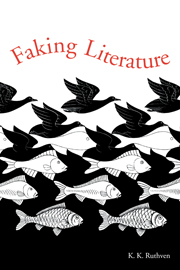Book contents
- Frontmatter
- Contents
- Acknowledgements
- List of abbreviations
- Prologue
- 1 Sampling the spurious
- 2 Framing literary forgery
- 3 Cultivating spuriosity
- 4 Faultlines of authorship
- 5 Fantasies of originality
- 6 Rhetorics of authenticity
- 7 Fake literature as critique
- Epilogue
- Bibliography
- Index of names
- Index of Subjects
3 - Cultivating spuriosity
Published online by Cambridge University Press: 22 September 2009
- Frontmatter
- Contents
- Acknowledgements
- List of abbreviations
- Prologue
- 1 Sampling the spurious
- 2 Framing literary forgery
- 3 Cultivating spuriosity
- 4 Faultlines of authorship
- 5 Fantasies of originality
- 6 Rhetorics of authenticity
- 7 Fake literature as critique
- Epilogue
- Bibliography
- Index of names
- Index of Subjects
Summary
Two intellectual developments in the final decades of the twentieth century made it possible to reconsider the relationship between ‘genuine’ and ‘fake’ literature. The more important was post-structuralist critical theory, which seriously challenged commonsense assumptions about such key components in traditional literary studies as authorship, originality, authenticity and value. And the other was the continuing anatomy of what Jean-François Lyotard labelled in 1979 ‘the postmodern condition’, which enables us to see literary forgeries as in some ways normalised by the spuriosities of everyday life. Together they provide the tools with which to critique traditional strategies for concealing the scandal of literature as a cognitive mode. And by doing so they reveal how the ritual scapegoating of those caught perpetrating literary forgeries distracts attention from the spuriosity of literature itself.
An appropriate place to start is with the post-structuralist critique of binary oppositions in thought processes, the aim of which is to demonstrate that each of the terms paired as opposites in the structuring of knowledge is never wholly autonomous but always and already implicated in the other. The notion that knowledge can be advanced by arranging phenomena into paired sets of opposites is a venerable mode of analysis perpetuated in media representations of public debate. Aristotle attributed the method to the Pythagoreans, whose categories included right/left, male/female and good/evil; and a recent book on ‘core sociological dichotomies’ describes over twenty of them, including fact/value, public/private, relative/absolute, and work/leisure.
- Type
- Chapter
- Information
- Faking Literature , pp. 63 - 90Publisher: Cambridge University PressPrint publication year: 2001



